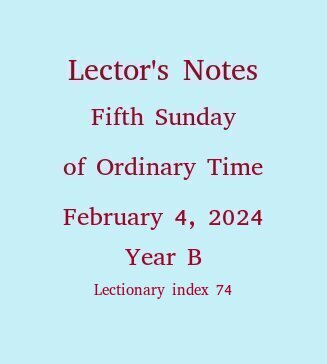

Fifth Sunday of Ordinary Time, Year B, February 4, 2024
The book of Job, uniquely in the Hebrew Scriptures, challenges one of the fundamental tenets of Jewish wisdom, the proposition that if you live a righteous life, God will reward you.
Ancient Corinth was a sophisticated city where many teachers proclaimed new religious and philosophical ideas. Paul, a stranger to the new Christian community there, has to establish his credentials. The virtues of which he boasts are surprising.
This gospel remembers Jesus healing, driving out demons, preaching and praying. It remembers Jesus' own words giving emphasis to one of those purposes.
Our Liturgical Setting: In today's gospel, from our year-long sequence of readings from Mark, all who were sick or demon-possessed came to Jesus for relief. Perhaps their plight prompted this selection of first reading.
The Literary Background: You probably already know the story of Job: A prosperous fellow, he suddenly experiences catastrophic, inexplicable losses of wealth, family and health. Friends try to explain it all as divine punishment for some secret sin, but Job knows better. What he doesn't know is why. He just keeps repeating, "The Lord gives and the Lord takes away. Blessed be the name of the Lord." Today's passage is a short excerpt from one of the long conversations among Job and his "friends."
Scholars agree that it's hard to agree on when and where the book of Job was written. Many of its parts are also exceptionally hard to translate. We classify it as "wisdom literature," along with Psalms and Proverbs. But Job challenges one of the fundamental tenets of Israelite wisdom, the proposition that if you live a righteous life, God will reward you. He faces squarely the problem of the suffering of the innocent, and does not confect a sugar-coated answer.
In the ancient Middle East (and in the modern Middle East, for that matter), one's status among peers was extremely important. To be dishonored was a source of great suffering, and suffering from another source was likely to bring one dishonor. Thus Job's friends jump to the conclusion that some hidden deed meriting dishonor has brought him suffering. Job's comparison of himself to a hireling reveals the importance of honor and shame in this dynamic. In that ancient culture, it was not polite to ask for work. One had to wait and hope that a man of higher status would hire him. (Imagine yourself on the sidewalk outside a day-labor agency, waiting to be sent to a job. Your eyesight is keen, and you recognize an old high-school classmate across the street, looking prosperous with a wool coat and leather briefcase. Wouldn't you turn your face to the wall?) Job's use of the hireling metaphor tells the depths of his shame.
(We read from Job only twice over our 3-year Sunday cycle, today and on Sunday 12 of Ordinary Time, Year B, this year. For the latter Sunday, I wrote a more thorough treatment of the book as a whole. Click here to read it.)
Proclaiming It: Notice the sequence of paired phrases. Let this table illustrate the pairings.
| Is not man's life on earth a drudgery? | Are not his days those of hirelings? |
| He is a slave who longs for the shade, | a hireling who waits for his wages. |
| So I have been assigned months of misery, | and troubled nights have been allotted to me. |
| If in bed I say,"When shall I arise?" then the night drags on; | I am filled with restlessness until the dawn. |
| My days are swifter than a weaver's shuttle; | they come to an end without hope. |
| I shall not see happiness again. |
The Historical Background: Corinth, while not an Athens, was a center of philosophical and religious ferment; new and bizarre ideas were constantly in the air. Christianity seemed to be at least an ambitious development of old Judaism, if not an entirely new religion, with plenty of yet unanswered questions. In this atmosphere, Paul had to make sure his credentials were convincing. So he spends all of chapter 9 defending his rights as an apostle.
An Important Theological Point: Paul always makes it clear that, of himself, he does not deserve the job. There is no "reason for me to boast." The gospel is greater than the messenger. Both because of this humility, and to make sure that his behavior gives no reason to doubt his message, he tried to exercise his authority modestly, making himself "a slave to all." He offers the gospel "free of charge," that is, without asking for the support he could justly request. (That some modern televangelists take no such pains is reason enough to dismiss them with no further questions asked.) (Later in this letter, Paul will vigorously remind the Corinthians of a similar truth about themselves; though rich in spiritual gifts, they are of themselves unworthy, and should acknowledge the gifts as gifts from a gracious God.)
Proclaiming It: Now you know what's behind Paul's emphatic and argumentative language. He is on fire about the gospel, zealous about his work, certain of his authority and careful about keeping the messenger out of the message. In these verses, he's defending his credibility. Well, make him sound credible by sounding emphatic yourself.
Ivan Kramskoi, Russian, 1837-1887, detail from his study for Christ in the Wilderness, 1867 or 1872. Here's the wikipedia article about the artist. The final work you will find more representational and recognizable, so recognizable that it inspired this interesting variation, for which the contemporary artist does not claim credit, at least not on the Web.
This page updated January 9, 2024